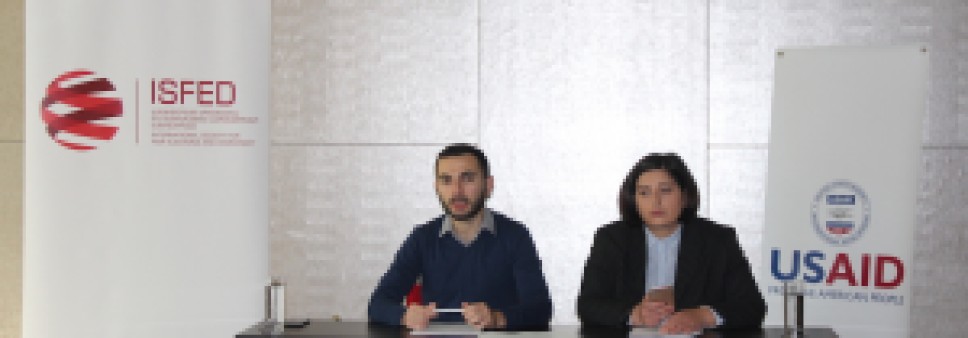Attempts to discredit NGOs, violations of campaign rules and interference with campaigning in ISFED’s second interim report
On October 8, the International Society for Fair Elections and Democracy (ISFED) presented the second interim report of monitoring the pre-election period of the 2018 presidential election of Georgia. The document mainly covers the period of September 9-30 but it also summarizes certain events that affected the electoral process beyond the reporting period.
Through the monitoring, during the reporting period ISFED identified 1 case of confrontation on political grounds; 1 case of possible vote buying; 12 instances of violations of campaigning rules; 9 cases of misuse of administrative resources; 8 instances of interference with campaigning; 14 cases of damaging of campaign materials. An illegal initiative of a political party about bookmaking regarding elections was also detected.
ISFED filed 17 complaints with the CEC, most of which concerned illegal canvassing by civil servants both through social media and by active actions. Complaints also dealt with misuse of administrative resources, participation of a religious organization in campaigning and the initiative of a political party Girchi about bookmaking regarding elections. ISFED filed a complaint with the State Audit Office requesting a probe into a possible vote buying by Shalva Natelashvili in Kutaisi.
During the reporting period, secret recordings were released by media, which implicated acting and former high-level officials in possible corrupt deals and uncovered possible illegal scheme of financing of the ruling party for elections. These recordings and accusations about a possible scheme of financing of the ruling party create reasonable suspicions about grand corruption and informal rule in the country. Under these circumstances, it is clear that the legislative framework of political financing and the existing monitoring mechanisms are not responsive to challenges that exist in the country.
Especially alarming trend is a wave of unethical statements and attempts of government officials and heads of administrative bodies involved in elections to discredit work of observer organizations. ISFED became a target of such attack by the chair of the Georgian National Communications Commission (GNCC). In addition, after 13 non-governmental organizations made a critical statement about the corruption scandal, the Chair of Parliament, the Minister of Justice, MPs from the Georgian Dream, Tbilisi Mayor and the presidential candidate endorsed by the Georgian Dream all made statements with the aim of discrediting the organizations. Such coordinated attacks on monitoring NGOs during the pre-election period amounts to harassment by the authorities, an attempt to limit activities of these organizations and to harm their professional reputation, which is threatening to democratic development of the country.
During the monitoring ISFED found that within working hours large amount of civil servants engaged in campaigning through their personal Facebook profiles in favor of the independent candidate endorsed by the Georgian Dream, Salome Zourabishvili. There were instances of direct campaigning in support of her as well as posts aimed to discredit Zourabishvili’s opponents. In addition, statements against Salome Zourabishvili were made by a representative of a religious organization, in violation of campaigning rules.
The report also covers instances of misuse of administrative resources – use of communications means funded by the local self-government budgets for pre-election purposes, in favor of Salome Zourabishvili, as well as instances of possible mobilization of local teachers and other civil servants for Salome Zourabishvili’s meetings.
Instances of interference with election campaigning were frequent. Attempts to disrupt meetings of Salome Zourabishvili and Grigol Vashadze were detected. Facts of damaging campaign materials of opposition candidates were also found.
According to final figures, 25 candidates have been registered for the presidential election. ISFED finds that four out of five presidential candidates registered by qualified parties that are members of the opposition alliance Power is in Unity do not have the interest of winning the election. Instead, they aim to support the UNM candidate, Grigol Vashadze through receiving benefits affordied to qualified parties by the electoral legislation. Presidential candidate of the European Georgia, Davit Bakradze is also using the support of the so-called “technical candidate.”
ISFED observers did not report any serious incidents and infringements during initial meetings of precinct electoral commissions in the reporting period. However, there was a trend that PEC members knew in advance who would be elected as PEC chair, deputy chair and secretary. In some cases it was obvious that PEC members lacked competencies – often electoral documentations were filled out by DEC representatives instead of them.
ISFED proposed several recommendations for improving the electoral environment:
- Government officials should immediately stop harassing and attacking non-governmental organizations. Instead of trying to discredit and harm reputation of monitoring organizations, they should treat civil society with respect.
- Political parties and electoral subjects should prevent their supporters from interfering with meetings and campaign activities of their opponents; they should avoid such forms of relationships with voters that create risks of vote buying; they should respect electoral legislation urge their supporters not to damage campaign materials of their competitors.
- Religious and charitable organizations should abide by requirements of the Election Code and refrain from participating in election campaigning in favor of a party or a candidate. Local self-government bodies should prevent campaigning by civil servants during working hours; observe political neutrality and prevent abuse of local budgetary or human resources for advancing party interests; inform local civil servants about their rights and responsibilities during election period.
- Law enforcement authorities should investigate the possible corruption deal involving the illegal scheme of political party financing immediately and without bias.
This report is made possible by the generous support of the American people through the United States Agency for International Development (USAID) and the National Endowment for Democracy (NED). Views expressed in this publication belong solely to the International Society for Fair Elections and Democracy and do not necessarily reflect the views of USAID, the United States Government or the NED

